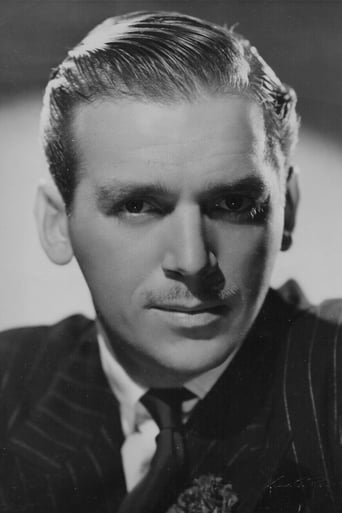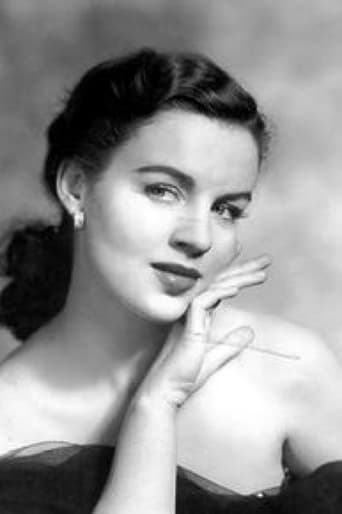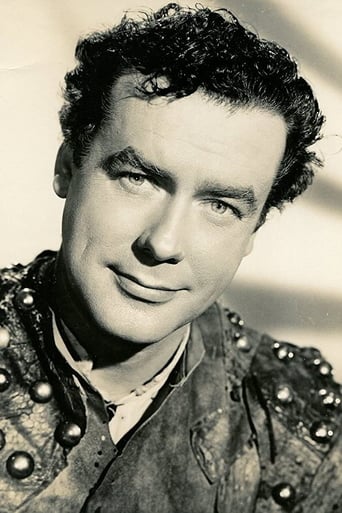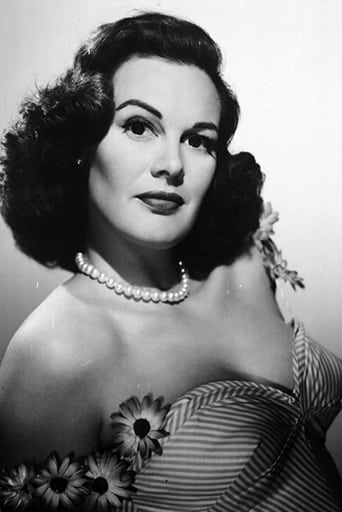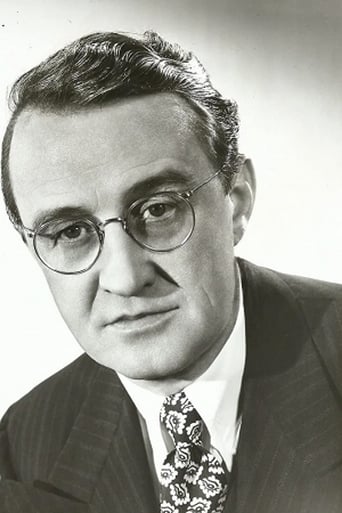Lachlan Coulson
This is a gorgeous movie made by a gorgeous spirit.
Isbel
A terrific literary drama and character piece that shows how the process of creating art can be seen differently by those doing it and those looking at it from the outside.
Logan
By the time the dramatic fireworks start popping off, each one feels earned.
sbasu-47-608737
Once again fooled by the score and the reviews and ended up in wasting money in getting the DVD. The movie was good, had it been in Fairbank Sr's, and that too his early ones, say late '19s to early '20s. But considering that it is a '49 movie, the less said is better.Mindless sword fights and big holes honeycomb the whole movie plot. The plot has been covered in all the reviews, so there is no use in repeating it.
The swashbuckling hero meets perchance the dame in distress and rescues her, as well as the prize possession, the Napoleonic Plot expose she is carrying. naturally no one would pause to think, why she has to carry this extremely critical invasion expose, with handful of soldiers (three to be exact, if one includes the coachman as one) and why the Royal army itself didn't march to protect the borders. The time and place has simply lost its significance. The fugitives, followed by the conspirators, go through arduous journey to Dublin, her father, the Viceroy's, territory. But at a certain point, while whiling away the time, his aides land up back into O'Flynn castle and discovers the mythical but real O'Flynn treasure, and that too in the nick of the moment bribe the army, and thereby save him from the court marshall. The distance between the seat of power and the different locations seemed to be very small, at least watching at the speed at which the people moved across them. A single man, often unarmed, against a well armed army and defeating them, even when they are militarily in a position of advantage and he isn't, is anyway something I have seen many times, and won't comment on. Why the blackguard, who is incidentally betrothed to the heroine, has to move around with his mistress, and no one, except his people, are privy to that, and to top it all, he perchance having his own private party in the same inn, where O'Flynn and his men are having their drunken orgy, and why he has to at all show his face there, or unnecessarily provoke O'Flynn into a duel, by when he should have been well aware that his opponent was a mercenary, of repute, so the duel could have gone either way. Not worth wasting the time, leave alone money, unless convert it into a silent movie, and transport it backwards in time by at least 30 years. At that time, well one could say it would deserve around 6.5 stars.
JohnHowardReid
Producer: Douglas Fairbanks Jr. Copyright 8 December 1948 by Universal Pictures Co., Inc. and Fairbanks Pictures, Inc. Released by Universal-International. New York opening at Loew's Criterion: 27 February 1949. U.S. release: February 1949. U.K. release: February 1950. Australian release: 14 April 1949. 8,513 feet. 94 minutes. Alternative title: The O'Flynn.SYNOPSIS: Staged in the eighteenth century, this story tells how a dashing young Irish landowner defeats Napoleon's plans to add Ireland to his empire.COMMENT: This little-known movie has a quality we greatly admire: enormous vitality and gusto. Fairbanks' sheer exuberance is so infectious we rejoice with him as he exclaims, "Castle O'Flynn", and are dispirited with him when he finds it to be falling apart. Helena Carter makes a gorgeous leading lady, radiant in Calthrop's costumes, while Richard Greene appears particularly well cast against type as the villain of the piece. Other welcome against-type castings are Ludwig Donath (Larry Parks' father in The Jolson Story) as the sinister Hendrigg and Patricia Medina as the not over-bright accomplice. Photography, sets, costumes notch up as wholly outstanding, and there is a bright music score. Astute film editing makes it appear Fairbanks is doing his own stunts, whereas in fact the more dangerous of them are doubled by David Sharpe (e.g. vaulting between the balconies, leaping onto the drawbridge). The action is brought to a happy conclusion by a traditional climax with the de rigeur sword duel between hero and villain resolved in a most unusual manner. All told, it comes as a most entertaining relief to find a hero whose cheek is not quite matched by his skill.OTHER VIEWS: This thrill-packed swashbuckler provides all audiences with outstanding entertainment. Expertly staged and directed, with superlative photography by none other than Arthur Edeson, this is a film in which Fairbanks Jr. goes close to emulating the famous action films produced by his father. Of course Fairbanks Sr. performed just about all his own stunt-work, whereas Junior falls back on a team of experts led by David Sharpe. Not that this matters as the doubling is so skilfully done that few if any people will tumble to the fact that the daring acrobatics they see on the screen, are not all the Fairbanks scion's own. — JHR writing as George Addison.
Tom Hodgins
Not a lot of people are familiar with The Fighting O'Flynn and for good reason. It's one of those Universal-owned productions of the 1940s that is, for the most part, frustratingly inaccessible today. I've only seen it because of a video recording made of the film when it was once broadcast on AMC.And that's a shame, for this light hearted costume adventure, produced by Universal-International and star Douglas Fairbanks Jr.'s own company is a surprisingly entertaining affair, chock-full of outrageous heroics and good natured humour.Fairbanks plays a charming Irish soldier-of-fortune returned to his native land from world travels at the picture's beginning in order to claim his inheritance from an uncle, Castle O'Flynn. On his way he encounters a beauty in a carriage who is besieged by what appear to be bandits.O'Flynn single handedly saves her from these scoundrels, setting up the thin story line of the film involving spies and traitors and a plot by Napoleon to set up a base in Ireland preceding an invasion of England. And just how does poor Napoleon think that he's going to succeed if he has to take on an Irish rogue like O'Flynn? It's a fairly handsome production, lensed in black-and-white, with nice sets and matte paintings of castles in the background. The cast is engaging and likable. Fairbanks, of course, is the dashing lead, and he gives a buoyant, enthusiastic performance, with a hint of an Irish accent that comes and goes.Fairbanks' acting is fairly broad at times, not entirely unlike his earlier effort as Sinbad the Sailor, undoubtedly with his father's silent acting technique kept in mind, to a degree (though he was, in fact, a far more diversified actor than his father, having performed throughout the years in various films genres, aside from adventure).It's interesting to compare Fairbanks' theatrical ever-smiling characterization to Errol Flynn's portrait of Don Juan, done about the same time. Flynn is cynical and quite subtle (a great performance in my opinion, even if he was physically past his prime), while Fairbanks is upbeat, optimistic and full of broad physical gestures.There's a fun sequence set in a tavern in which the bragging Fairbanks is challenged to a duel by the film's chief villain, a smooth, elegant traitor, played by Richard Greene. Greene, however, is fairly drunk at this moment so Fairbanks, to even the score, proceeds to consume a large amount of liquor before starting the fight.He overdoes it, however. In fact, he now sees two Richard Greenes standing before him. So Greene, to show that he, too, is a good sport about this duelling business, has some more beer, before the two start to have a fairly wild swinging saber fight. Perhaps this is a keen illustration of a duel that is not very good intentionally since both its protagonists are thoroughly looped. It also helps to cover up the fact that neither actor was particularly proficient with a sword in the first place. Only in this duel, that's okay.The Fighting O'Flynn works its way up to an over-the-top climax on a castle battlement with swords clashing, rockets firing into a night sky, and Fairbanks triumphing single-handedly over five or six opponents. All very silly, of course, but also a lot of fun. And that's what a film like this is all about. This was Fairbanks' last costume adventure, and he went out with a good one.There's a scene near the film's beginning in which Fairbanks, who often seems to be carrying a shillelagh in his hand, first sights his inherited castle. There's a low camera angle peering up at the actor as he beams a wide smile, extends both arms wide open to each side and enthusiastically proclaims, "Castle O'Flynn!!!" I smiled very broadly at this. There's no doubt that son was paying homage to his father then. It could have been right out of The Black Pirate. It's a moment that is pure Doug Fairbanks Senior.
documain-1
For some reason, this film is not available for purchase anywhere. Strange, since so many worthless products are easy to locate. It is sad that this movie is so disregarded, in that this movie is Douglas Fairbanks, Jr.'s best performance. You could argue that Gunga Din is a better movie, and that is true. Still, Fairbanks' performance as O'Flynn far outshines his work in Gunga Din. He holds together a slim plot line, and has some of the wittiest dialog you will ever find in a movie. O'Flynn's character is a charmer, loved by men and women, and somewhat of a con man. The dialog has many nice touches. For example, O'Flynn knocks unconscious one of the French soldiers (Henry Brandon), who later gets the drop on O'Flynn. In an off-hand remark, O'Flynn says to the Frenchman, "You must have a terrible thick skull." A great touch. Perhaps because Fairbanks was the producer and wrote some of the screenplay, we are getting more than the run of the mill swashbuckler. His pursuit of the almost painfully prim Lady Benedetta (Helena Carter) is full of poetry, romance, and charm, and she even remarks that his words are "…very nimble and very Irish." The supporting cast are all veterans, and good performers. Aside from Helena Carter, Richard Greene portrays excellently the weak and corrupt Lord Sedgemonth. Arthur Shields and J.M. Kerrigan provide great repartee in the lighter moments. Patricia Medina is great as Lord Sedgemonth's paramour, Fancy Free, who "only likes the good life," and says the Lord Sedgemonth must do the right thing by her, "…give me money." Add to this a remarkably good musical score, and you have a great and entertaining movie. It is obvious that this film suffered from a small budget, since it was shot in black and white, and if nothing else, this film screams for color. Perhaps it could be looked upon as a lesson on how to do more with less. Fairbanks, in this film, is every bit of the "presumptuous popinjay" he is accused of being by Richard Greene. You could hardly spend a better 94 minutes.
